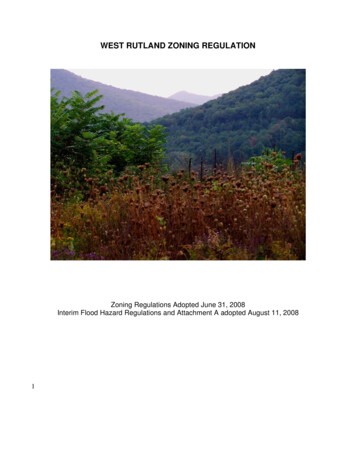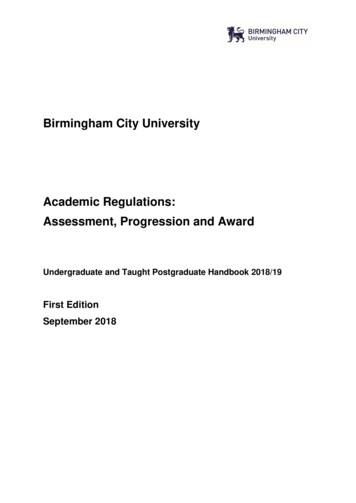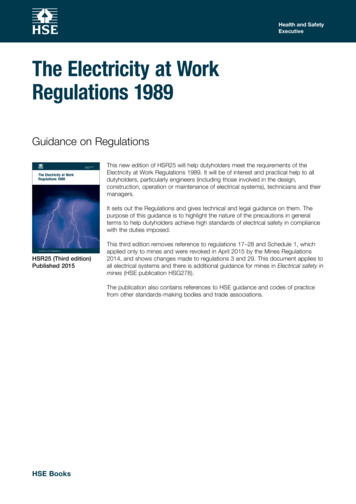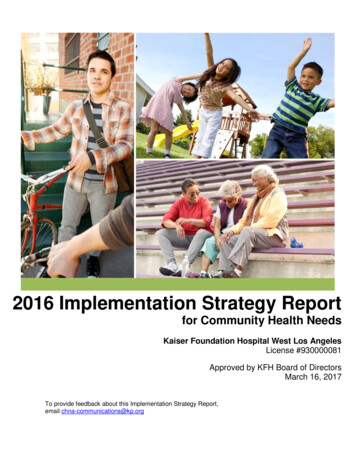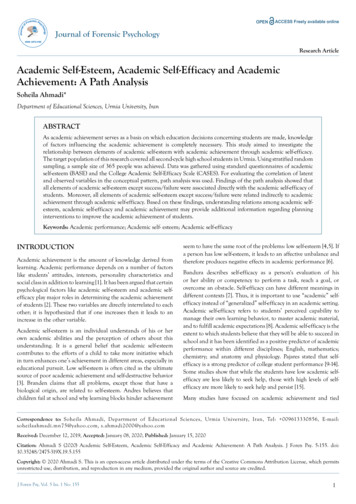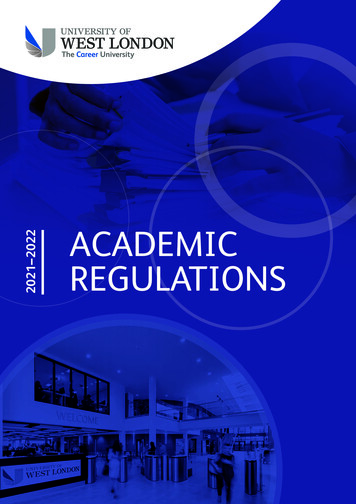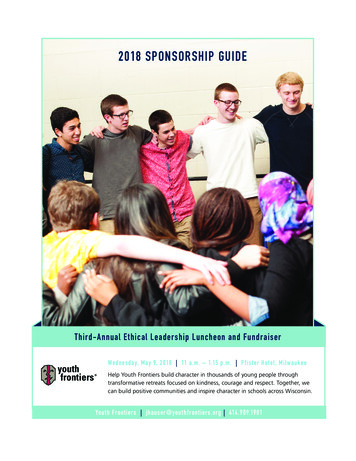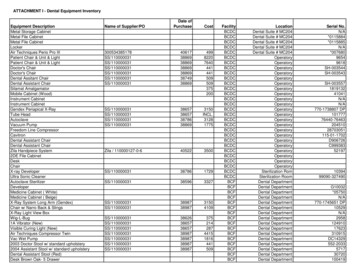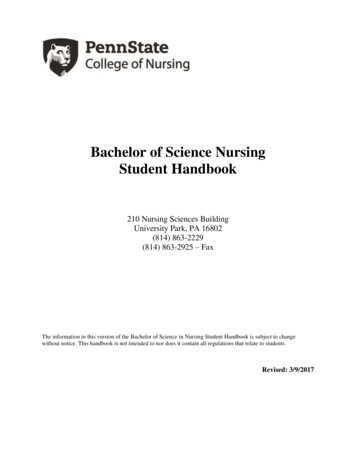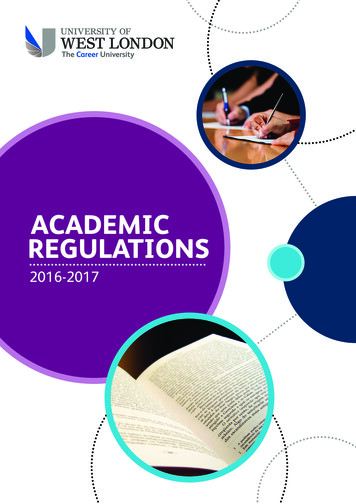
Transcription
ACADEMICREGULATIONS2016-2017
Responsibility of: RegistrarApproval date: September 2016Review date: June 2017Approved by: Academic BoardConsultation via: Academic RegistryPublished by: Academic Registry, University of West London
Table of ContentsGlossary and Acronyms5GlossaryAcronyms57Section 1 - Framework and opeApproval of Regulations, Courses and ModulesDesignation of Special RegulationsAssessment BoardsModule Assessment Boards (MABs)Membership of MABsAward Boards (ABs)Membership of ABsStudent Progress Boards (SPBs)Membership of SPBsJoint Assessment Boards (JABs)Membership of JABsCause for ConcernResponsibilities of the Head of School/College within the Assessment ProcessResponsibilities of the Secretary to Assessment Board within the AssessmentProcessResponsibilities of the Chair of Assessment BoardRelationship between ABs and SPBsThe Publication of Results to StudentsExternal ExaminersCourse and Module ion 2 - General rameworkScopeApplicabilityStudent Identity CardAdmissionAdmission with Advanced Standing CreditStudent conductFalsification of DocumentsConcurrent StudyChange of CourseModes of StudyEnrolment and RegistrationPermission to Study in the United KingdomModule RegistrationUniversity of West London - Academic Regulations 2016 -171
Attendance and ParticipationAward of Academic CreditDeferralWithdrawalStudent-Initiated WithdrawalUniversity-Initiated WithdrawalRevocation of AwardsErasmus Exchanges and Study AbroadRegulations for the Conduct of AssessmentSetting of Examination PapersExamination TimetableInvigilationSpecial ArrangementsIllness and Mitigating Circumstances for Invigilated ExaminationsCourseworkPractical AssessmentOral ExaminationsDissertations and ProjectsProfessional CapabilityExtensionsMitigating CircumstancesMitigation PanelOutcomeAppealAcademic OffencesStage I: InformalStage II: Formal (Minor Offence)Stage III: Formal (Major Offence)Appeal RegulationsAuthority and DelegationsGrounds for AppealSubmitting an AppealActions on Receipt of a Request for AppealNotification of Outcome of an AppealActions where an Appeal is upheldActions where an Appeal is not upheldAppeal Panel CompositionAppeal Panel Terms of ReferenceAppeal Panel ProcedureReview by the Office of the Independent Adjudicator (OIA) for Higher 133343535363737394040414142434343444445Section 3 - Undergraduate pplicabilityAcademic Credit Accumulation SchemeMinimum and Maximum Period of RegistrationModule Passes, Resits and Retakes464646464647University of West London - Academic Regulations 2016 -172
.3.17.3.18.3.19.3.20.3.21.Number of AttemptsFailure of a ModuleResitsRetakesProgression and AwardsFailure to meet Progression RequirementsCompensationAward RequirementsCredits and Named AwardsHonours ClassificationRequirements for an Award of Diplomas and Foundation DegreesRequirements for an Award of CertificateNamed AwardsAegrotat AwardsRevocation of AwardsSpecial Regulations for BSc (Hons) Nursing, BSc (Hons) Operating DepartmentPractice, BSc (Hons) Midwifery Courses47474848494949505051525353545555Section 4 - Postgraduate Taught 606161FrameworkScopeApplicabilityGeneral RequirementsMinimum and Maximum Period of RegistrationAcademic CreditsSubmission to AssessmentProgression Regulations for Integrated MastersModule Passes, Resits and RetakesNumber of AttemptsFailureResitsRetakesAward Requirements and ClassificationSpecial Regulations for all variants of the PgDip Nursing CourseSection 5 - Postgraduate Research abilityPrinciplesApplication and Entry RequirementsInitial EnrolmentRegistrationRegistration PeriodSupervisionProgramme of studyMonitoring ProgressTransfer of Registration from Master to Doctor of PhilosophySubmissionUniversity of West London - Academic Regulations 2016 -173
mination ProcedureThe Candidate’s Responsibilities in the Examination ProcessExaminersFirst ExaminationRe-ExaminationFollowing the Award81828283848789Appendices91Appendix 1911.1.1.1.2.1.3.The Role and Responsibilities of the University Research Degrees SubCommitteeTerms and Conditions of the University Research Degrees Sub-CommitteeMembership of the University Research Degrees Sub-CommitteeConstitution and Terms of Reference of the University Research Degrees SubCommittee91919292Appendix 293Specimen Thesis Title Page93Appendix 394Specimen Commentary Title Page94University of West London - Academic Regulations 2016 -174
Glossary and AcronymsGlossaryAcademic credit: An indicator of the amount and level of learning.Academic level: The relative complexity, depth of study, and learner autonomy required inrelation to a module in the context of its discipline. Each module shall be assigned a levelfrom the following scale:Level 3: Foundation or pre-degree levelLevel 4: IntroductoryLevel 5: IntermediateLevel 6: FinalLevel 7: MastersLevel 8: Research levelAcademic year: A period running from 1 August to 31 July. The years of study of mostundergraduate courses follow academic years, and policies and regulations are normallywritten by academic year.Advanced standing: Prior, certificated study from another institution deemed equivalent tothe University modules from which exemption is sought.Assessed coursework: Coursework that students are required to complete and submit, andwhich contributes in whole or in part to module marks and awards.Average mark: The weighted average of a student’s performance, calculated in accordancewith the regulations for the award, on which the classification of the award is based. It isrounded to the nearest whole number.Award: Undergraduate, graduate, and postgraduate certificates, diplomas, bachelor’sdegrees, and undergraduate and postgraduate Masters degrees. The awards offered by theUniversity are detailed in the Academic Regulations.Calendar year: A twelve month period. Many Masters courses run for a full calendar year,which may cross two academic years.Compensation: Compensation of failed academic credits is a measure to reduce the needfor referral assessment (i.e. resit or retake) where the student has demonstrated academicability through passing requisite number of academic credits and achieving certain averagemark.Core module: A module that must be taken and passed to meet requirements forprogression or award.Course: A course is an approved and validated combination of modules leading to an awardby the University of West London.Delegated authority: Where the authority invested in an individual or body is delegated toanother individual or body for a specified purpose.University of West London - Academic Regulations 2016 -175
Dissertation, project, research project: An extended piece of independent study assessedby an output report or extended essay. The dissertation or project comprises a significantpart of most Masters courses. There is also a dissertation as part of the Honours challengefirst degrees, e.g. BSc (Hons) Nursing includes a dissertation.Element of assessment: An individual item of assessment. The assessment for a modulemay comprise several elements of assessment.Enrolment: A process by which individuals become students of the University. Newstudents must pre-enrol before enrolment, and returning students must re-enrol each year.External Examiner: A professional academic from outside the University who monitors theassessment process for fairness and academic standards.Field of study: The description of the group of modules in a particular discipline passed bya student. This is represented in the title of the award conferred upon a student.Mitigating circumstances: Circumstances that are outside a student’s control which mayhave an adverse impact on a student’s ability to undertake or complete an assessment so asto cast doubt on the likely validity of the assessment as a measure of the student’sachievement.Module: An approved block of teaching and learning leading to the award of academic creditand forming part of a course of study.Module assessment: Assessment of the performance of a student on a module. This mayinclude a variety of elements and forms, including coursework, dissertations, practicalassignments and exams.Module mark: The overall module result. This may be an aggregate of marks from severalelements of assessment, which may be weighted.Notional study hours: The number of hours required to complete an academic credit,module, or course.Prerequisite module: A specified module that must be taken before a second specifiedmodule can be taken.Progression: The process of moving from one level of study to the next, or from the taughtelement to the dissertation, placement or project element of a course.Registration: A process by which a student signs up for modules of a course of study.Research students: Students registered for a course of study specifically designated as aresearch course. Research courses have separate Academic Regulations.Resit: The repeat of all or part of a module’s assessments, following failure at a previousattempt including non-submission. Resits do not involve the repeat of attendance for themodule. The assessment mark is normally capped at the pass mark.Retake: The repeat of a module following failure at a previous attempt including nonsubmission. Retakes involve attendance, payment of tuition fee and completion of allelements of the module, and the submission of all assessments (summative and formative).They count towards the value of academic credit for which students must normally beregistered in an academic year. Retakes may incur pro rata tuition fees. The assessmentmark(s) for a retake of a module is not capped.University of West London - Academic Regulations 2016 -176
Threshold mark: A specified minimum mark normally prescribed by a Professional,Statutory or Regulatory Body that must be obtained in one or more elements of assessmentin order to pass a module. This is in addition to, and distinct from, the requirement to achievea pass in the module mark to pass the module.University: The University of West London, unless otherwise specified.AcronymsABAward BoardAPCLAccreditation of Prior Certificated LearningAPELAccreditation of Prior Experiential LearningARAcademic RegistryDBSDisclosure and Barring ServiceEThOSBritish Library Electronic Theses Online ServiceHEARHigher Education Achievement RecordINSTILInstitute for Teaching, Innovation and LearningJABJoint Assessment BoardMABModule Assessment BoardMCMitigating CircumstancesNMCNursing and Midwifery CouncilPGPostgraduatePGRPostgraduate ResearchPSRBProfessional, Statutory or Regulatory BodySAMStudent Attendance MonitoringSPBStudent Progress BoardSSStudent ServicesSUStudents’ UnionUGUndergraduateUWLUniversity of West LondonVCVice-ChancellorUniversity of West London - Academic Regulations 2016 -177
Section 1 - Framework and Governance1.Framework1.1.Introduction1.1.1.The Academic Regulations incorporate both the general regulations that apply tostudents of the University, and the regulations for assessment, progression andaward. The Academic Regulations regulate the principal the articulation andmanagement of the University’s academic standards for taught and researchawards.1.2.Applicability1.2.1.These regulations shall take effect from the academic year 2016-17, and shallsupersede all previous regulations and policies for the areas detailed within,except where it is specifically stated that the regulations in force at the time of astudent’s enrolment apply.1.3.Scope1.3.1.The Academic Regulations apply to all undergraduate and postgraduate coursesleading to awards of the University or the award of academic credit and to thestudents registered on those courses.1.3.2.The Academic Regulations comprises five sections. Each section states, wherenecessary, to which courses and students it refers.1.3.3.Where separate arrangements apply to research studies these are detailed inSection 5 - Postgraduate Research Regulations.1.3.4.In some cases, separate arrangements may apply to courses offered by AcademicPartners. Such arrangements are set out in the relevant memoranda of agreementand supporting documentation for the Academic Partnership.1.3.5.All references to the Academic Regulations include course specifications, moduleregulations and special regulations.1.3.6.The University reserves the right to amend the Academic Regulations. Suchchanges will be made in response to national quality and standard frameworks,requirements of PSRBs or are of benefit to students. If the regulations shouldchange, the University will determine the extent to which the changes apply andstudents will be consulted and advised by direct communication to their UWL livee-mail addresses and via the Student Portal. Prospective students will becontacted directly via the University website. All concerns raised by students willbe considered and agreed by the Academic Board before being put into effect.University of West London - Academic Regulations 2016 -178
1.4.Approval of Regulations, Courses and Modules1.4.1.The Academic Board is responsible for the management of the academicstandards and quality of courses leading to awards of the University. TheAcademic Regulations shall be approved by the Academic Board.1.4.2.The Academic Board shall approve courses of study and individual modules,including any amendments and closures. All courses of study shall lead to awardsof the University.1.4.3.The University reserves the right to amend any course of study or module, and towithdraw any course of study or module where there are insufficient students, toensure that courses remain current and also in response to staff changes.Normally, amendments to courses of study and modules shall be enacted for thenext cohort to join the course, or group to take the module. Where an amendmenthas an effect on students currently registered for the course or module, thosestudents shall be formally notified of the change at a revalidation event andprovided with an opportunity to object should they wish to do so. Once approved, acourse closures shall not normally take place until all students registered on thecourse have completed.1.5.Designation of Special Regulations1.5.1.Special Regulations are academic regulations for individual courses of study thatdiverge from the standard Academic Regulations for the University where there isa legitimate academic rationale, or a specific requirement set down by aProfessional, Statutory or Regulatory Body (PSRB), or a joint or collaborativecourse requires it. Special regulations shall be designated as such through thecourse approval process, and approved by the Academic Board or its delegatedauthority.1.5.2.Special regulations may apply to some courses and modules. Such regulationsshall be detailed in the appropriate course and module regulations.1.6.Assessment Boards1.6.1.Assessment Boards – Module Assessment Board (MAB), Award Board (AB),Student Progress Board (SPB) and Joint Assessment Board (JAB) - operate withauthority vested in them by the Academic Board and ensure that the followingfunctions are carried out in the interests of maintaining academic standards:a) by reference to the University’s commitment to equality and diversity toconsider all matters relating to the assessment and award of individualstudents;b) to assure the academic standards of all courses leading to a University award;c) to determine accurate and fair marks for individual students and applyprofessional judgement as to the appropriateness of any moderation ormitigation by taking into account the circumstances of students and thejudgements made by assessors;d) to determine whether students are required to be re-assessed, progress orreceive an award;University of West London - Academic Regulations 2016 -179
e) with the contribution from External Examiners, to analyse the performance ofstudents within and across academic courses, with a view to ensuringacademic standards are consistent within the University and comparable tostandards in other universities.1.6.2.Assessment Boards for students studying with the University within an academicpartnership arrangement follow the same principles as those stated above andoperate under the same rubrics and regulations as those stated in the AcademicRegulations, unless special regulations have been approved.1.6.3.Assessment Boards consist of University staff and External Examiners only. Thesole exception will be for Assessment Boards for Academic Partnerships, whererepresentatives of a partner institution are required to attend where Universitystudents within an Academic Partnerships are being considered.1.7.Module Assessment Boards (MABs)1.7.1.A MAB is established by the relevant School/College Board for each subject areawhich is concerned with modules that are assessed by the University.1.7.2.The MAB is responsible for determining the assessment results for each modulewithin its remit. This responsibility extends to all modules whether within themodular scheme or provision under the purview of a PSRB.1.7.3.The MAB should seek to use the meetings with its External Examiner(s) to assesscomparability of standards and achievements in the subject from year to year andacross the whole range of modules within the remit of the MAB.1.7.4.A MAB is required to:a) consider the results of assessment and examination of modules, including theperformance in supervised work experience where applicable, and decide, inaccordance with the approved module regulations, on the results of theassessment;b) ensure that the marks and the recommendations for re-assessment arerecorded accurately and reported to the ABs/SPBs (SPB);c) ensure, where this is required by the regulations, that the External Examiner(s)are fully involved with its deliberations and concur in its decisions of the MAB;d) receive, consider and accept mitigation recommendations;e) receive and record report(s) from Academic Offences Panel(s);f) ensure that any matters of policy which arise from its deliberations are referredto the School/College Board;g) ensure that the marks recorded as correct by the MAB are not changed by theAB/SPB, unless the Board is in possession of information affecting theassessment of an individual student or a whole module cohort, in which case itcan exercise discretion in regard to the agreed marks.1.8.Membership of MABs1.8.1.The members of each MAB shall comprise:a) Head of Subject (or authorised designate) as ChairUniversity of West London - Academic Regulations 2016 -1710
b) Module Leader or nominee for each module within the remit of the MAB.c) in the case of Level 5 and Level 6 modules (and, where appropriate, Level 4modules), the External Examiners for the subject area;d) a representative of a partner institution shall be expected to attend wheremodules from a course offered wholly or in part at that institution under acollaborative agreement are being considered by the MAB.1.8.2.Note on quoracy: In order for a MAB to be quorate the following attendees must bepresent:a) the Chair shall normally be the Head of Subject. The Head of School/Collegemay authorise a small number of experienced academics to act as designateChairs in exceptional cases. All Chairs must have completed the requisitetraining;b) the Chair cannot act as a nominee for a Module Leader;c) *at least one External Examiner (unless only Level 4 modules are beingconsidered);d) a Module Leader or nominee for each module being considered.1.8.3.In the case of resit Boards, the Board may proceed in the absence of the ExternalExaminer provided always that:a) the External Examiner has viewed and commented on an appropriate sample ofassessments;b) the External Examiner has provided written authorisation for the MAB toproceed in his/her absence;c) the External Examiner subsequently ratifies the relevant results.1.9.Award Boards (ABs)1.9.1.ABs will be established by the School/College Board for each set of courses in theUniversity. The School/College Board will determine the timings of ABs, togetherwith the academic courses covered by each Board. An AB may meet in more thanone session with a variable membership to cover the range and volume of results tobe considered.1.9.2.The AB will receive the modular marks, duly attested by the MAB, for all courses forwhich it is responsible. It will interpret the performance of individual studentsaccording to the rubrics of the relevant assessment regulations.1.9.3.The Board will:a) consider the results of assessment and examination of an individual student'swork, including the performance in supervised work experience, whereapplicable, and decide, in accordance with the approved regulations and therelevant policies of the Academic Board, in the case of successful final yearstudents, the Award to be made or to be recommended to external awardingbodies;b) receive recommendations concerning exit awards for any students who havewithdrawn, and/or any whom the School/College has withdrawn, and decideupon the award to be made or to be recommended to external awardingbodies;University of West London - Academic Regulations 2016 -1711
c) reconsider its decisions, either as the full Board, or part thereof acting as aReview Panel, if it is required to do so by the appeals procedure, acting on theauthority of the Academic Board in accordance with the agreed procedures ofthe Academic Board;d) ensure that External Examiners are fully involved with its deliberations andconcur in its decisions.1.10.Membership of ABs1.10.1.The members of each AB shall comprise at any time:a) Head of School/College (or authorised designate) as Chairb) Course Leader (or designate) of each course within the remit of the Board;c) Head of School/College responsible for modules which contribute significantlyto courses within the remit of the Board or designate;d) External representative as may be appropriate in respect to other courses notwithin the Modular Scheme shall have the right to attend but their presence isnot a requirement of the AB membership;e) an External Examiner(s);f) a representative of a partner institution shall be expected to attend where acourse offered wholly or in part at that institution under a collaborativeagreement is being considered by the AB.1.10.2.Note on quoracy: In order for an AB to be quorate the following attendees must bepresent:a) The Chair shall normally be the Head of School/College. The Head ofSchool/College may authorise a small number of experienced academics toact as designate Chairs in exceptional cases. All Chairs must have completedthe requisite training;b) the Chair cannot act as a designate for a Course Leader;c) at least one External Examiner;d) Course Leader or designate for each award being considered.1.11.Student Progress Boards (SPBs)1.11.1.A SPB will be established by the School/College Board for each set of courses inthe University. The School/College Board will determine the timings of SPBs,together with the academic courses covered by each Board. A SPB may meet inmore than one session with a variable membership to cover the range and volumeof results to be considered.1.11.2.Schools may exceptionally have to hold an interim SPB when students have notreached a progression point. The purpose of an interim SPB is to provide a “healthcheck” for students and identify those who are failing or not submitting toassessment.1.11.3.The SPB will:a) consider all continuing students and confirm their right to progress whererelevant; (not applicable to Interim SPB);University of West London - Academic Regulations 2016 -1712
b) consider all continuing students who have not achieved the level of creditappropriate to their stage of study and agree actions to support students whomay be considered to be at risk of not continuing (this may include, deferral,withdrawal);c) recommend to the AB a suggested exit award for any students who havewithdrawn, or those whom the School/College has withdrawn;d) receive and record report(s) from Academic Offences Panel(s);e) determine the next study pattern for individual students seeking an alternativeroute to a named award and recommend to the AB the title of the award to beconferred in accordance with the regulations;f) reconsider its decisions, either as the full Board, or part thereof acting as aReview Panel, if it is required to do so by the appeals procedure, acting on theauthority of the Academic Board in accordance with the agreed procedures ofthe Academic Board.1.12.Membership of SPBs1.12.1.The members of each SPB shall comprise at any time:a)b)c)d)Head of School/College (or authorised designate) as Chair.External ExaminerCourse Leader or designate of each course within the remit of the Board;the Personal Tutor(s) responsible for students whose results the Board isconsidering;e) Head of School/College or designate responsible for modules which contributesignificantly to courses within the remit of the Board;f) a representative of a partner institution shall be expected to attend where acourse offered wholly or in part at that institution under a collaborativeagreement is being considered by the Board.1.12.2.Note on quoracy: In order for a SPB to be quorate the following attendees must bepresent:a) the Chair shall normally be the Head of School/College. The Head ofSchool/College may authorise a small number of experienced academics toact as designate Chairs in exceptional cases. All Chairs must have completedthe requisite training;b) the Chair cannot act as a designate for a Course Leader;c) an External Examiner must be present for at least one (full not interim)meeting of the SPB per annum. They must attend the inaugural SPB for a newcourse;d) a Course Leader or designate for each course being considered. If no CourseLeader or designate is present, consideration of the student results must bedeferred.1.13.Joint Assessment Boards (JABs)1.13.1.A JAB may be established by the relevant School/College Board for sets ofmodules and courses where this Board is appropriate. The JAB can take placeonly when a course comprises modules that are not taught on any other course ofUniversity of West London - Academic Regulations 2016 -1713
study within the University or for courses of study at academic partnerships whereit may be best practice to hold the MAB, SPB and AB on the same day.1.13.2.The School/College Board will determine the timings of the JAB, together with theacademic courses covered by each board. A JAB may meet in more than onesession with a variable membership to cover the range and volume of results to beconsidered.1.13.3.The JAB will initially convene as a MAB to:a) consider the results of assessment and examination of modules – includingthe performance in supervised work experience where applicable – anddecide, in accordance with the approved module regulations, on the results ofthe assessment;b) ensure that the marks and the recommendations for re-assessment arereported accurately;c) ensure that its duties are fulfilled within the schedule agreed by theSchool/College Board.1.13.4.If the JAB is in possession of information affecting the assessment of a wholemodule group, then it may exercise discretion in regard to the agreed list of marks.1.13.5.Marks established as correct at this time cannot be changed.1.13.6.The JAB will then reconvene as an AB to:a) consider the results of assessment and examination of an individual student’swork, including the performance in supervised work experience, whereapplicable;b) decide, in accordance with the approved regulations and the relevant policiesof the Academic Board, in the case of successful final year students, theAward to be made or to be recommended to external awarding bodies;c) receive, consider and accept mitigation recommendations;d) receive and record report(s) from Academic Offences Panel(s).1.13.7.The JAB may then reconvene as a SPB to:a) consider all continuing students who have not achieved the level of creditappropriate to their stage of study and agree actions to support students whomay be considered to be at risk of not continuing;b) receive, consider and accept mitigation recommendations;c) receive and record report(s) from Academic Offences Panel(s).1.13.8.The JAB will:a) reconsider its decisions if it is required to do so by the Academic Board;b) ensure, where this is required by the regulations, that the External Examinersare fully associated with its deliberations and concur in its decisions or withthose of any formally constituted sub-committee of the JAB;c) ensure that any matters of policy which arise from its deliberations are referredto the School/College Board (in the first instance);d) ensure that its duties are fulfilled within the schedule agreed by theSchool/College Board.University of West London - Academic Regulations 2016 -1714
1.13.9.The final list of marks will be signed by the Chair of the JAB and, whereappropriate, External Examiner(s).1.14.Membership of JABs1.14.1.The members of the JAB shall comprise:a) a Module Leader or nominee for each module within the remit of the Board;b) the Course Leader or designate for each Course within the remit of the Board;c) in the case of Level 5 and 6 modules (and where approp
degrees, and undergraduate and postgraduate Masters degrees. The awards offered by the University are detailed in the Academic Regulations. Calendar year: A twelve month period. Many Masters courses run for a full calendar year, which may cross two academic years. Compensation: Compensation of failed academic credits is a measure to reduce the need
